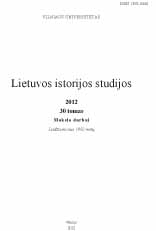PATRIMONIALIZMAS: LENKIŠKOJI SĄVOKOS VARTOSENOS TRADICIJA IR JOS SANTYKIS SU MAXO WEBERIO SAMPRATA
Patrimonialism: Polish tradition of concept’s usage and its relation to Max Weber’s conception
Author(s): Nerijus BabinskasSubject(s): Social Sciences
Published by: Vilniaus Universiteto Leidykla
Summary/Abstract: The author of the article suggests to renounce the stereotyped assumption that every agrarian society in the Middle ages, which established its statehood, should be necessarily defined as feudal. Instead of that, he proposes to look for alternative categories and to sketch the so-called “typological scale”. As a worth noting “candidate” the author suggests patrimonialism, the concept which has been in use among Western sociologists and historians for many decades. The author presumes that patrimonialism is a less ambiguous and more clarified concept than the notorious Asiatic mode of production. The concept “patrimonial monarchy” is also frequently used by Polish historians to define the regime of the early Polish state (in the epoch of the Piast dynasty). Some Lithuanian historians adopted the same term from Polish colleagues and use it to define the peculiarities of the early Grand Duchy of Lithuania (before the official baptism). On the other hand, there are obvious differences between the attitude of Western scholars toward patrimonialism (influenced directly by the famous German sociologist Max Weber) and the one of Polish historians toward the same concept (the latter attitude also prevails among Lithuanian historians). Actually, Western scholars suppose that any premodern society could be either patrimonial or feudal. The coexistence is impossible, while for the Polish historians the early Polish state is patrimonial and feudal at the same time. With this contradiction in mind, the author presupposes that there are two separate traditions of using the concept of patrimonialism: Western (or rather Anglo-Saxon), which follows Weber’s approach, and the Polish one which adopted the concept directly from the Swiss jurist Karl Ludwig von Haller (Weber itself borrowed the term from Haller, but he did not accept the whole Haller’s conception of Patrimonialstadt). After a thorough analysis of the text of the classic of German sociology itself, the author of the article draws the conclusion that, despite some ambiguities, Weber treated feudalism and patrimonialism as the antagonistic regimes. The current research of historiography has proved that there are at least two different traditions of using the concept of patrimonialism, but there are also some exceptions. The attitude of Polish historian Iwo Leopold Jaworski toward patrimonialism is quite similar to that of Weber. He claims that there was a rotation of juridical-political structures in premodern Europe. The Grand Duchy of Lithuania as well as Poland were patrimonial, but they both skipped the feudal stage. Besides, the contemporary Lithuanian sociologist of history Zenonas Norkus has recently made a provoking attempt to apply the concept of patrimonialism in the Weberian sense to the regime of the Grand Duchy of Lithuania in the epoch of Vytautas the Great.
Journal: Lietuvos istorijos studijos
- Issue Year: 2012
- Issue No: 30
- Page Range: 171-188
- Page Count: 18
- Language: Lithuanian

